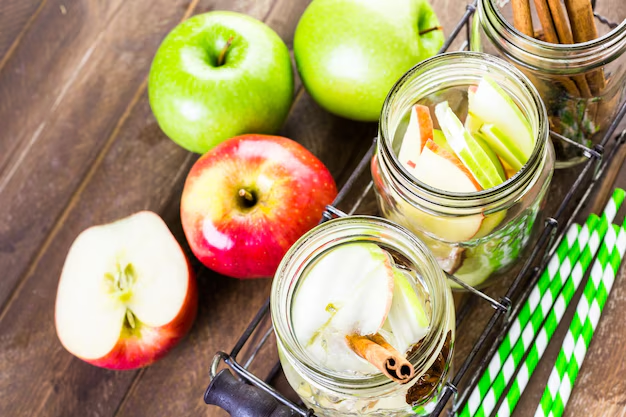Your Guide to Does Apple Cider Vinegar Help With Hypertension
What You Get:
Free Guide
Free, helpful information about HyperTension FAQ and related Does Apple Cider Vinegar Help With Hypertension topics.
Helpful Information
Get clear and easy-to-understand details about Does Apple Cider Vinegar Help With Hypertension topics and resources.
Personalized Offers
Answer a few optional questions to receive offers or information related to HyperTension FAQ. The survey is optional and not required to access your free guide.
Can Apple Cider Vinegar Lower Your Blood Pressure? Here's What You Should Know
Apple cider vinegar (ACV) has been touted as a natural remedy for a variety of health issues, including hypertension, or high blood pressure. With its rising popularity as a home-based solution, it’s essential to discern between anecdotal claims and scientifically supported results. Can apple cider vinegar really help manage hypertension, and if so, how? Let's dive into the details to provide you with a clear, informed perspective.
The Science Behind Apple Cider Vinegar and Blood Pressure
The acetic acid in apple cider vinegar is believed to have several health benefits. Some preliminary studies in animals have shown that acetic acid can help to lower blood pressure. These studies suggest that the compound might help to regulate the enzyme renin, which plays a key role in maintaining blood pressure levels. However, despite these promising results in animal subjects, research involving human participants is limited.
Human studies are necessary to verify the true impact of ACV on blood pressure, and so far, there's no conclusive evidence to firmly advocate for its use as a blood pressure-lowering tool. Health experts often stress that while apple cider vinegar could support some lifestyle interventions, it should not be used as a primary treatment for hypertension without consulting a healthcare provider.
How to Safely Incorporate Apple Cider Vinegar
If you're considering adding apple cider vinegar to your health regimen:
- Consult your doctor: Before making any significant changes to your health routines, especially one involving a condition like hypertension, it's prudent to seek medical advice.
- Start small: If approved, begin with a small amount, such as one teaspoon diluted in a glass of water. Gradually increase to no more than two tablespoons a day.
- Combine with a healthy lifestyle: ACV should complement, not replace, other healthy practices like a balanced diet, regular exercise, and prescribed medications.
Bridging Health and Financial Well-being
Managing hypertension is not just about incorporating dietary supplements but also involves ensuring access to necessary medication and resources, which can be financially burdensome for some. If you're juggling healthcare expenses, let’s explore some ways to alleviate that financial pressure.
Financial Assistance for Healthcare
Discovering avenues for financial aid can significantly reduce stress and ensure you continue receiving necessary medical care. Below are some options to consider:
- Government Aid Programs: Check if you qualify for health-related government assistance programs that provide financial relief for medications and healthcare services.
- Non-Profit Organizations: Many organizations offer financial support for medical needs, including medications and consultations.
- Healthcare Grants: If you're engaging in research or need particular treatment, educational and healthcare institutions sometimes offer grants.
Relevant Financial Resources
Here’s a handy list of potential financial aids to explore:
- 💊 Pharmaceutical Assistance Programs: Reduce prescription costs by applying to programs offered by many pharmaceutical companies.
- 🏥 Medicaid and Medicare: Explore these government programs for comprehensive health coverage if eligible.
- 🎓 Educational Grants: Consider this if pursuing healthcare education or related studies; they can cover a range of expenses.
- 📈 Debt Relief Options: For those under significant financial strain, consider debt relief services to manage healthcare debt effectively.
Balancing health challenges like hypertension with financial responsibilities can seem daunting, but by exploring these resources and making informed health choices, you can build a more secure, stable future.
What You Get:
Free HyperTension FAQ Guide
Free, helpful information about Does Apple Cider Vinegar Help With Hypertension and related resources.

Helpful Information
Get clear, easy-to-understand details about Does Apple Cider Vinegar Help With Hypertension topics.

Optional Personalized Offers
Answer a few optional questions to see offers or information related to HyperTension FAQ. Participation is not required to get your free guide.


Discover More
- a 66 Year Old Female With a History Of Hypertension
- Are Eggs Bad For Hypertension
- Are Eggs Good For Hypertension
- Are Endocrine Disorders Causing Hypertension Rare
- Can Adderall Cause Hypertension
- Can Alcohol Cause Hypertension
- Can Allergies Cause Hypertension
- Can Anemci People Get Hypertension
- Can Anemia Cause Hypertension
- Can Antibiotics Cause Hypertension
